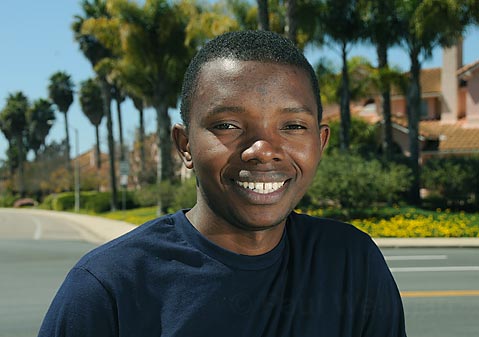From Survival to Forgiveness
Rwandan Genocide Survivor Brings Message of Peace

The world over, people are at odds over their differences. Often, conflicts over faith, language, ethnicity, or any combination of other factors result in violence. Several times in the past century, such differences have manifested in the form of genocide. The European Holocaust of World War II is the most often discussed, but the world has witnessed genocides in Cambodia, Bosnia, Rwanda, and most recently in the Darfur region of Sudan. Monday, April 7 marks the 15th anniversary of the beginning of the 100-day Rwandan genocide, during which between 800,000 and 1 million people are estimated to have been systematically killed by two militias associated with the Hutu ethnic group in a culmination of a long-running conflict between them and their Tutsi rivals. The militias – associated with the political parties Interahamwe and Impuzamugambi – killed anyone who was either Tutsi or pro-peace, calling them “cockroaches” and effecting much of the killing with machetes.
For the past couple of weeks Michel Nsengiyumva – a 28-year old survivor of the Rwandan Genocide – has been enjoying Santa Barbara in his first visit to the United States. Having begun his journey by spending the day in the bustling metropolis of New York City, he spent a week in New York state before heading west with Santa Barbaran Mary Jo Terrill to speak to different groups – including at Santa Barbara City College and at Congregation B’nai B’rith – about his experiences and to pass on some of the wisdom that he’s acquired from his life so far. Extremely calm and often wearing an easy smile, he sauntered into The Indy offices carrying a guitar, his peaceful demeanor giving no indication of the violence he witnessed as a teenager.
Currently working on his master’s degree in communication in Kenya, Nsengiyumva dedicates much of his free time to spreading a message of peace and love – particularly in Kenya, where recent electoral disputes erupted in violence. “You can’t forgive just because someone says to forgive – it’s a process,” he said, adding that finding the positive aspects of any situation has helped him tremendously in dealing with the horrors of the past. His own process inspired him to write a book on love and forgiveness, which he is working on presently, and he has written a few songs on the subject as well. The songs are mainly geared toward Kenyans, and one has even been recorded onto CD. “For me [election violence in Kenya last year] was like they hadn’t heard what happened in Rwanda, right next door. They knew about the genocide of the Jews, and still they would dare to kill their fellows.”
Digging to what he said was the root of the problem, Nsengiyumva said that the Hutu and Tutsi divisions within Rwandan society are actually not related to ethnic differences but instead to a socioeconomic disparity that was exploited by the Belgians during colonial times. The Tutsi were the wealthier group, and allegedly were favored by the Belgians for leadership positions over the poorer Hutu. The Hutu eventually gained control of the country when the Belgians allowed democratic elections in 1960, and after decades of conflict between the two groups after Rwanda gained independence in 1962, the Interahamwe and Impuzamugambi were able to use the April 6, 1994 assassination of then-president Juvenal Habyarimana to initiate what is perhaps one of the most organized programs of mass killing the world has ever seen. With a Tutsi mother and a Hutu father, Nsengiyumva was on the wrong end of the hostilities during Rwanda’s extreme flash of violence, and was forced to flee to Congo with his surviving family members. “It was a very systematic, organized genocide, and it was very sad,” he said.
Nsengiyumva and Terrill met in 2006, when Terrill was visiting Africa with Network for Africa, a nonprofit with projects benefiting widows and orphans in Rwanda and its neighboring countries. As she was walking past the Baptist church where Nsengiyumva’s father is a pastor, she heard the congregation singing and stepped inside to check it out. Terrill, a social worker and nursing supervisor with Cottage Health System, has been to Africa several times to volunteer her counseling skills. Nsengiyumva, who was working on a bachelors’ degree in psychology at the National University of Rwanda when they met, was very interested in her experience, and the two became friends. “It was interesting to see that counseling wasn’t something rigid – to see active listening and how it works,” said Nsengiyumva.
Although he said Rwanda and other countries in the region have many problems to work out, he was optimistic about the future. Noting that most people in Santa Barbara are much wealthier than his countrymen, he encouraged people to reach out and help. “Santa Barbara people should go see what’s happening there. During the genocide, the country of a thousand hills became the country of a thousand problems. We are still dealing with those problems, but now we have 1,001 solutions,” he said with a broad, peaceful smile.



